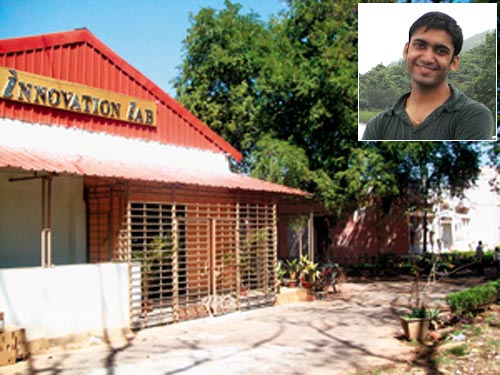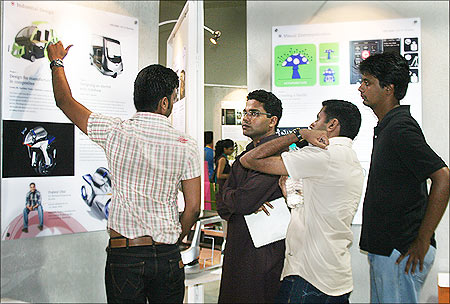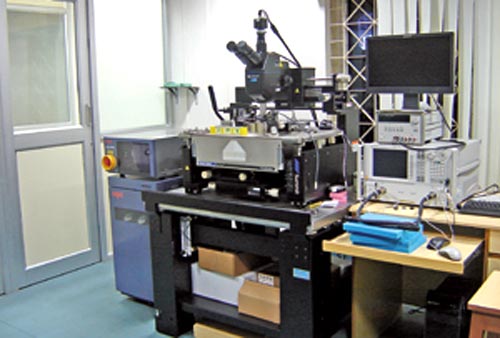 | « Back to article | Print this article |
Now, become an entrepreneur while still in college!
Premier engineering institutes across the country are offering a supportive environment to students with an idea and the goods to back it up. Read on to know how these young graduates have risen to be successful entrepreneurs.
In 2006, Shwetank Jain was in the final year of his BTech programme at the Indian Institute of Technology-Kharagpur.
For his project, Jain decided to work on delivering innovative engineering solutions with specific focus on energy efficiency and power quality enhancement.
After several rounds of presentations, the scope and viability of his project emerging as a venture became obvious.
Soon his venture, called P2 Power Solutions, was incubated by the Technology Incubation and Entrepreneurship Training Society (TIETS) at the IIT-Kharagpur.
In October 2012, the organisation will celebrate its sixth anniversary. Shwetank is an example of the burgeoning numbers of student entrepreneurs. Many of them are the products of Technology and Business Incubators (TBIs) that operate on college campuses.
Please click NEXT to continue reading
Office space, furniture, computers are provided at subsidised rates
If you've heard of Webaroo, Bhugol GIS and SMSGupshup.com, then you must know that these ventures came into existence because they were nurtured and incubated by SINE, the tech incubator housed at IIT-Bombay.
SINE or Society for Innovation and Entrepreneurship, is an umbrella for promotion of entrepreneurship at IIT Bombay.
It provides infrastructure, business advisory services and financial assistance to incubate companies.
"The infrastructure provided includes office space, furniture, computers as well as shared resources such as meeting rooms, canteen among others. These are provided at subsidised rates. In lieu of the subsidy, SINE takes a small equity and revenue share from the start-ups," explains Sushanto Mitra, CEO, SINE-Bombay.
Some of the other graduated companies that have already established a footprint in their respective field are eInfinitus, Mobiance Technologies, Herald Logic, Voyager2Infotech, Geosyndicate Power, Myzus Technologies, Powai Labs, SecLore Technologies, Feast, Girish Kumar Telecom and Zeus Numeric.
SMS Gupshup is a mobile group SMS service that allows users to create mobile communities and broadcast messages to them. It was formed by a team of IIT-Bombay alumnus-Beerud Sheth and Rakesh Mathur.
Co-founded by Amit Patel and Kruti Patel in 2005, mySetu, an EHS and TPM software development company, is incubated in SINE.
"We introduced our idea of developing software product for EHS&S, to be hosted on cloud environment. To support this idea, we had our business plan ready in place and after rounds of meeting our company was incubated in January 2011," says Amit Patel.
'Having the knowledge and running a business are two different things'
IIT-Kharagpur is one of the few institutes in the country that runs a separate programme on entrepreneurship.
Science and Technology Entrepreneurs' Park (STEP) at IIT-Kharagpur, focuses on viability of research projects to commercialisation and provide counselling services to aspirants.
Some prominent companies incubated at STEP include Centre for Advanced Communication, which works to create advanced VLSI-based wireless communication kit and set-up for engineering laboratories, Golton Rubber that deals with husk processing for making rubbers and Capillary Technologies that helps retailers constantly follow their customers.
The latter founded by Aneesh Reddy, Krishna Mehra and Ajay Modani caters to over 100 major brands worldwide, reaching over 10 million consumers.
From batchmates to colleagues
KritiKal with strengths in both embedded system design and real time computer vision and imaging solutions was founded in 2002 by seven graduating students including Jatin Sharma, Nishant Sharma and Dipinder Sekhon of IIT-Delhi's computer science department.
KritiKal was the first student-led start-up from the institute.
"Having sound knowledge in a field and running a business in that particular area are two entirely different things," said Dipinder Sekhon talking about challenges of entrepreneurship.
Another start-up from IIT-Delhi that has managed to make a mark is the VirtualWire Technologies, a wireless and communications firm.
The incubation process
Quality of ideas, maturity of development of idea, capability of the team to execute the ideas, marketability of the idea, commitment to idea, financial strength of start-up, fundability of the start-up and the mentoring capability of the institution are some parameters, which potential ventures are gauged upon.
"The biggest challenge I faced was to make the plan as practical and executable as possible. The expert committee of TBI raised questions and apprehensions that challenged my capability as a fresher. I needed to convince them that I had complete faith in my idea," says Paramdeep Singh, proprietor of Param Health Foods based in Mohali, Punjab.
His venture was incubated under Vellore Institute of Technology-TBI and was launched in September 2006.
Finding VCs and angel investors
Technology start-ups involve new products, processes and business models.
Sometimes, they are so novel that the capital market is not even familiar with them. Venture Capital is one funding option.
Then there are the angel investors. These are High Networth Individuals, who invest in a start-up for a minority share in the business.
"Indian Angel Network has an incubator unit of its own that not only facilitates the initial funds but also provides desk-to-desk mentoring for Incubatee companies. Angel members are mostly successful entrepreneurs and industry veterans who are passionate and keen to help high potential start-ups," shares Padmaja Ruparel, President, Indian Angel Network, a leading venture capital group.
Illustration: Uttam Ghosh
New age of entrepreneurs

Gone are the days when a plum placement offer with a leading organisation was the only means to gauge the success of an individual.
Among the Gen Y, many desire to become their own boss.
The support and mentoring offered by various technological institutes provide a conducive environment for entrepreneurship. And an increasing number of techno grads are waiting to take off!




